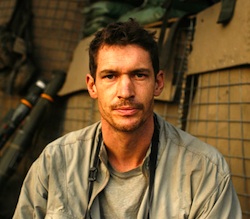By Jason Apuzzo. War photographer and documentarian Tim Hetherington was killed yesterday in Libya, while covering the civil war there. The New York Times reports on the incident here. We extend our condolences to his friends, family and colleagues.

Hetherington’s extraordinary documentary about the Afghanistan war, Restrepo, was nominated for an Oscar just last year (read Joe Bendel’s Libertas review here). Hetherington was one of the leading photographers and documentarians of his generation, a courageous and poetic soul who studied literature at Oxford and who brought a writer’s sensibility to his work. He will be missed.
I invite Libertas readers to take a few moments and watch what was apparently Hetherington’s last film effort, a short film called Diary which I’ve embedded above. It’s really an astonishing piece of filmmaking – richly suggestive of what a talent Hetherington was, and of the depth of his passion for justice.
Posted on April 21st, 2011 at 9:44am.
Restrepo was a phenomenal documentary. Visually stunning. The world just lost a great talent.
Indeed. Thanks for checking in, Wilson.
It looks like Tim had some flashes of cinematic talent. (I’m not trying to go overboard here) It has that eeriness, ironically, of Apocalypse Now. It also reminds of some of Kubrick’s work and even Scorsese’s Taxi Driver. That eeriness is not other worldly but rather a familiarity of the emotions of dread and fear. A sense of impending doom amongst the monotony of everyday war. (notice I didn’t say life) Everyone knows that feeling to one degree of another but We don’t typically seek it out. To be honest I’ve not felt that in a movie in a LONG LONG time. (At least not since the funeral home scene with Jodie Foster in Silence of the Lambs)
I think the film above indicates some very significant talent. I watched the film earlier today and it’s still lingering with me.
It’s heartbreaking to ‘discover’ a filmmaker of this ability right as we’re losing him.
That is an amazing piece of work. There’s just so much going on there — so much inspiration for discussion … and that’s just the structure and the subject matter, not the craftsmanship.
The first thing I couldn’t escape was the horrifying reality that this may be the natural order of things — and that peace, justice, and rule of law is actually the exception. The sequence of the little girl in England provided a really nice contrast to the rest of the film — it looked like a dream.
Aesthetically, I couldn’t explain it better than you did, Jason: He does indeed bring a literary approach to his work. This was obviously more abstract that Restrepo, which had an amazing narrative and sense of urgency for a documentary — I thought it was constructed like an action film.
As for feature filmmakers, the closest person I could think that elicits this sort of response from me is Terrence Malick — and the most amazing thing about Hetherington’s accomplishments is that he captures that type of imagery in the most unimaginable circumstances. Malick has time to set up those shots he gets, and to me that makes Hetherington’s eye a little more impressive.
I couldn’t agree with you more. I don’t want to overstate matters, but I think this little film is almost French New Wave-level in terms of its sophistication in melding poetic, subjective imagery with documentary reality of the most vivid sort. What a loss this represents that this man is no longer with us.